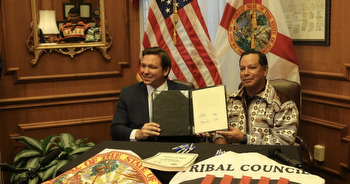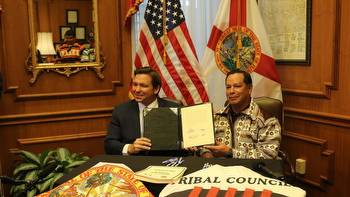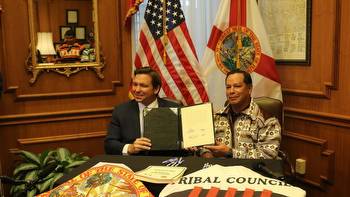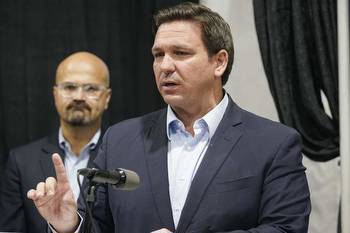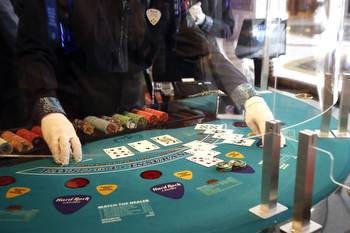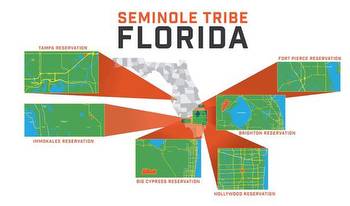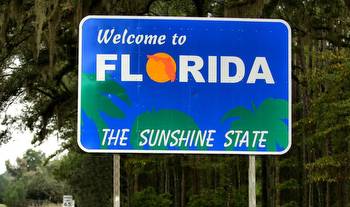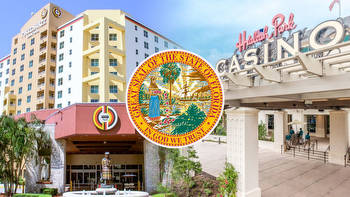Florida lawsuit challenges new Seminole gambling compact
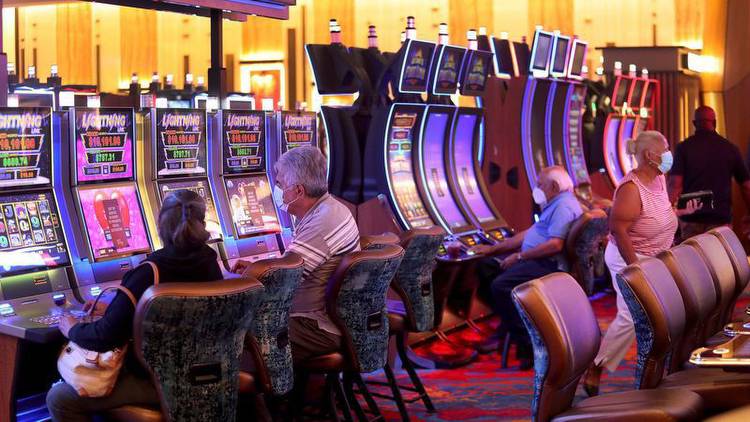
TALLAHASSEE — One of Florida’s oldest parimutuel companies, owner of Miami’s Magic City Casino and the Bonita Springs Poker Room, has filed a federal lawsuit challenging the Florida gaming compact between the state and the Seminole Tribe of Florida, alleging that the sports betting component is a based on “legal fiction” that violates federal law.
The lawsuit, filed Friday in U.S. District Court for the Northern District of Florida by the Havenick family’s West Flagler Associates and Bonita-Fort Myers Corp. — also known as Southwest Parimutuels — argues that the agreement authorizing sports betting outside of tribal lands in Florida is in violation of the Indian Gaming Regulatory Act and asks the court to enjoin implementation of sports betting.
Florida legislators ratified the compact signed by Gov. Ron DeSantis and Seminole Tribe Chairman Marcellus Osceola Jr. during a three-day special session in May, allowing Florida to join dozens of others states in offering sports betting and opening the door to the broadest expansion of gambling in Florida in a decade. In exchange, the Tribe will guarantee at least $500 million in annual revenue payments to the state for the next 30 years.
Under the deal, anyone in Florida over age 21 can start placing and collecting online wagers on sporting events “via the internet [or] web application” from anywhere in Florida beginning on Oct. 15. All transactions would go through servers located on tribal land in a “hub and spoke” model intended to bypass both federal and state law, which both deem sports betting in Florida illegal.
“While we are fully supportive of Gov. DeSantis and his work to secure a new Seminole Compact, the lawsuit focuses on a very narrow aspect of the Compact — the legality of off-reservation and online sports wagering,’' said Isadore Havenick, vice president for public affairs for Southwest Parimutuels.
The company argues that it will “lose millions” in revenue “because individuals in Florida can now gamble from the comfort of their homes, which will significantly, if not completely, impair Southwest Parimutuels’ ability to compete with the tribe.”
The compact allows sports bets at six of the Tribe’s reservations but permits Florida’s existing racetracks and jai alai frontons to develop their own mobile apps and to conduct off-reservation sports bets if they are chosen by the Tribe as its partners. The parimutuels would then be allowed to take 60 percent of the proceeds from each bet with the Tribe receiving the remaining 40 percent.
Question over “tribal land?”
At issue is a provision in the deal that says that a bet is “deemed” to be placed on the Tribe’s land because of the location of the server. The lawsuit argues that arrangement contradicts the Indian Gaming Regulatory Act, the Wire Act and the Unlawful Internet Gambling Enforcement Act, as well as court decisions interpreting those laws.
“’Deeming’ the bet to have been placed on Indian lands because the servers are located there contradicts decades of well-established precedent interpreting applicable federal law’' reads the 67-page complaint. “Contrary to the legal fiction created by the 2021 Compact and Implementing Law, a bet is placed both where the bettor and the casino are each located.”
The hub and spoke model violates the Indian Gaming Regulatory Act, the lawsuit argues, because while the state may enter into a compact with a Tribe to authorize gambling, it must occur “on Indian lands.” The act describes that to mean “all lands within the limits of any Indian reservation” or lands held in trust by the United States for the intended benefit of the Indian tribe.
In addition, the lawsuit argues that the deal violates the federal Wire Act of 1961, which prohibits the use of interstate commerce for illegal transactions, and violates the Unlawful Internet Gaming Enforcement Act by allowing bets to be placed outside of tribal lands.
Gary Bitner, spokesperson for Seminole Gaming, defended the compact and cited polls the company has done.
“The Gaming Compact fully complies with the law and is supported by Floridians 3-1,’' he said. “It guarantees $2.5 billion in revenue sharing in its first five years, the largest commitment by any gaming company in U.S. history.”
The governor’s office did not respond to requests for comment.
The deal is awaiting approval from the U.S. Department of Interior, which has 45 days after the compact was submitted to it to make a decision. A spokesperson for the governor said the compact was mailed to the agency on June 3, but the lawsuit said it was formally presented to DOI on June 21.
The tribe is also facing a threat from a constitutional amendment for the 2022 ballot proposed by two of the nation’s top sports betting platforms, FanDuel and DraftKings, that would authorize online sports betting at all Florida parimutuels, professional sports stadiums, and anywhere else in the state using a mobile sports betting platform.
When debating the compact in May, legislators anticipated the legal challenge based on the unprecedented nature of the hub and spoke model.
“As we’ve said from Day One, and as the parties have contemplated, it is an open question,” said Rep. Sam Garrison, a Fleming Island Republican and a lawyer during the House debate. “There is no black and white answer whether the hub and spoke model is going to be permitted or not,’'
Rep. Randy Fine, a Palm Bay Republican and former gambling executive, told his colleagues during floor debate that he didn’t think the sports betting component would survive but argued the deal was still a good one for the state because of a severability clause in the compact, whereby the tribe is allowed to continue the other provisions of the deal and would pay the state a commensurate amount.
In addition to continuing to operate banked card games, including baccarat, chemin de fer, and blackjack at the tribe’s seven casinos in Florida, the compact allows the tribe’s Hard Rock casinos in Broward and Hillsborough counties to add roulette and craps, giving them full Las Vegas-style casinos.
The court could sever the sports betting component from the gambling deal, and the Tribe would reduce the annual revenue share with the state by about $100 million, according to Seminole Gaming CEO Jim Allen.
Who is ‘intended audience?’
But legal scholars say the court could arrive at another alternative: invalidate the hub and spoke model but allow the tribe to continue to operate sports books as a monopoly.
“If a federal court were to determine that the off-reservation elements of the compact violate IGRA’s ‘Indian lands’ requirement, then the severability provision would allow the Seminole Tribe to operate sports books on Indian land, while the parimutuel operators lose their limited right to participate,’' said Daniel Wallach, a lawyer gambling consultant who has studied Florida’s laws.
Wallach argued that the timing of the lawsuit is significant because the severability clause “is triggered only by a federal court ruling and has no applicability when it is the federal agency which disapproves the compact.”
“Therefore, the intended audience for this ‘pre-approval’ lawsuit may very well be U.S. Secretary of Interior Deb Haaland in order to persuade her to reject the compact and thereby prevent the compact’s severability clause from coming into effect and creating a brick-and-mortar monopoly on Indian lands,’' he said.
West Flagler Associates and its affiliates have been owned and operated by the Havenick family for over 65 years when the patriarch of the family, Isadore Hecht, bought Flagler Greyhound Park in the early 1950s. Magic City Casino reports having 425 employees.
Wallach said that because the Havenicks are a competitor to the tribe, they have standing to challenge the compact. He predicts they will prevail.
“This is a slam-dunk case, so long as there was a willing plaintiff with ‘standing’ to sue,” he said. “Today, Magic City took its best shot. And I don’t think they’ll miss. They have a solid case.”
The compact was negotiated with the tribe by the governor and, in addition to concerns about its legality, many conservative legislative members who traditionally considered sports betting a risky expansion of gambling, withheld their opposition.
The governor and Lt. Gov. Jeanette Núñez lobbied the measure aggressively, as the governor held a veto threat over hundreds of legislative projects in the $110 billion budget. The House approved the deal on on a 97-17 vote and the Senate approved it 38-1 .
The lawsuit notes that when Congress enacted the Indian Gaming Regulatory Act, it found that “Indian tribes have the exclusive right to regulate gaming activity on Indian lands if the gaming activity is not specifically prohibited by federal law and is conducted within a state which does not, as a matter of criminal law and public policy, prohibit such gaming activity.”
The complaint states that because Florida law prohibits any expansion of gambling without statewide voter approval, the compact is “an effort to circumvent this clear prohibition in the state Constitution” by allowing for “a person sitting on her poolside lounge chair or his couch at home placing a sports bet through the tribe is ‘deemed’ not to be placing a bet that is otherwise illegal in the state.”
It continues: “this is nothing more than a legal fiction belied by the fact that sports betting is still taking place outside the tribe’s reservations in a state where sports betting remains illegal.”









